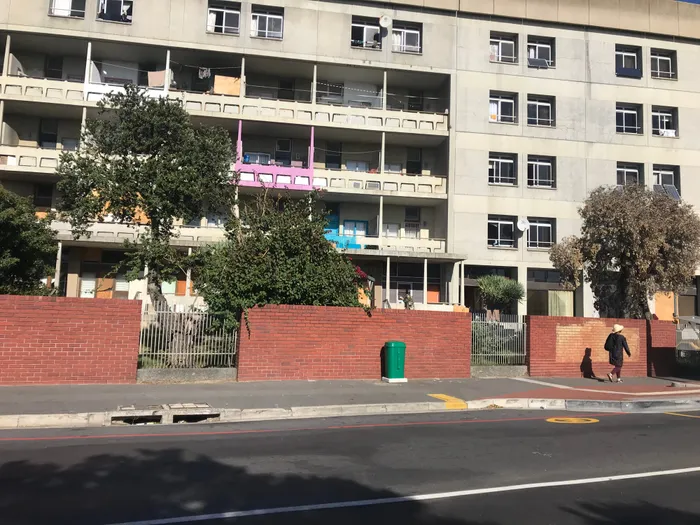Occupied building back in spotlight

The Helen Bowden nurses’ home has been occupied by housing activists since 2017.
The budget allocation of R2.8 billion for the City’s Human Settlements Directorate over the next three years, has thrust the Helen Bowden Nurses’ Home and its proposed development, back into the spotlight.
The Green Point building was renamed Ahmed Kathrada House by the Reclaim the City housing activists who moved in and have been illegally occupying it since 2017.
While the City and the provincial Department of Transport and Public Works (DTPW) agree that the former nurses’ home has the potential to become a formal social housing development, the activists refuse to move and are sceptical about who will benefit from social housing opportunities should the building be redeveloped.
RTC member Sheila Madikana, who moved into the nurses’ home in 2017, estimates that there are close to 800 people living there. Most don’t have electricity or running water, but there are security officers on the premises.
“They want the place to be demolished and they suggested moving us to a place past Atlantis. It’s not realistic or acceptable,” said Ms Madikana.
“It’s been five years since they told us about demolishing this place and they want us to move. Where must we move to? Are they going to put us back here after they build? We know it’s such a lie and we are not going to leave this place,” she said.
The Department of Public Works, however, said they were “committed to strategic and integrated spatial transformation”, citing Conradie Park in Pinelands and Founders Garden in the CBD as examples.
“Current plans for the Helen Bowden nurses home include its demolition and redevelopment into a much larger scheme which will deliver a high number of social housing opportunities in the CBD, for residents on the housing waiting list,” said Jandré Bakker, the department’s head of communications.
“Helen Bowden nurses home holds great potential and is set for redevelopment which would include social housing and affordable housing units but this process has completely halted due to the current unlawful occupation,” Mr Bakker added.
Malusi Booi, mayoral committee member for human settlements, added that for the social housing model to be viable, land needed to be made available and occupants must be willing to pay rent. He added that the City developed its Human Settlements Strategy “to deliver more affordable housing, in partnership, at scale and with innovation”.
“It is estimated that roughly 500 000 housing opportunities need to be created between now and 2028,” he said.
“Urbanisation will continue and the associated growth in informality. This is not a problem that is unique to Cape Town,” said Mr Booi.
“Occupants of social housing projects must be willing to pay rental money every month for this model to be sustainable. The rentals are highly subsidised and for those earning up to R22 000 per month.”
Meanwhile housing rights organisation Ndifuna Ukwazi, said there were more questions than answers when it came to the City’s human settlements plan.
“What will be the criteria for affordability? Who will qualify? Will affordable housing be in the form of social housing under the Social Housing Act? Will it be all ownership and/or rental? How will these units be affordable in perpetuity? Without addressing the foundational details, public land could be lost to the private sector with little delivery for the families in need,” asked Ndifuna Ukwazi in a statement released to the media.
The organisation added that the lack of time frames was “deeply concerning”, noting that in 2019 Mr Booi had conducted a ground breaking ceremony at the Pine Road site in Woodstock, which was still undeveloped.
“RTC and NU want three things - firstly the maximum number of social and affordable homes in the inner city. These must cater to the working class people that live and work within the inner city.”
“Secondly, we would like the City to put conditions on the inner city property markets such that they are affordable for the poor and working class and this must be done through various land-based instruments and inclusionary housing.”
“Finally, we would like the City to stop criminalising the poor, working class and street-based people. This includes providing sufficient protection for tenants and those living in the inner city along with alternative accommodation if they are evicted, either by the state or the private sector,” the statement continued.
